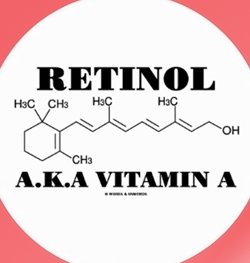You have no items in your shopping cart.
Problems Adding to Cart? Click here for assistance.

These days a degree in clinical pharmocology is needed just to read the packaging of drug store products. So, occasionally, I'll post an explanation of treatments and key ingredients. Feel free to make requests.
Retinol is the name given to the vitamin A group. Retin-A was the first cream on the market and still only available by prescription. The active ingredient is tretinoin, the acid form of vitamin A. It was originally prescribed as an acne treatment and it recent years has been used against wrinkles.
It is advised to build up use gradually as it causes itchiness, dryness, peeling. Clinical trials have shown that the discomfort peaks at around two weeks of use and then decreases, which is when you can step use to once a day. Retinol may cause thinning of the skin (so no more waxing). The risk of sunburn becomes severe.
Only a very small amount of Retin-A - a pea-sized dab - is needed to cover the entire face. Applying more will not speed up or improve results. Because Retin-A is drying to the skin, your doctor may also recommend that you apply a moisturizer once or twice a day. This routine is usually continued for about eight months to a year, after which you'll be switched to a less-frequent schedule of maintenance, with Retin-A applications only two or three times per week. At periodic follow-up visits, your doctor may adjust the strength of your prescription or its frequency of use. To maintain the benefits of Retin-A, its use must be continued for a lifetime.
In recent years, Retin-A has had competition from Differin gel and Avita gel and cream. They are marketed as being less irritating and expensive that Retin A, but they are relatively similar. Retin-A is also available as a generic. Some dermatologists recommend avoiding the generic form because this product is an irritant and this could be exacerbated by whatever base the generic uses.
Retin-A is not FDA approved for anti-aging. Renova, made by the same company, is. With age, skin becomes much drier and unable to tolerate a product like Retin-A. Renova was developed in response to this need. Renova contains .05% tretinoin, but it is in a moisturizing base.
There is at least one peer-reviewed trial that demonstrated (on the arms on 36 87-year old ladies) that retinol does reduce fine lines and increase collagen production.
See our Five Best with Retinol 2014
Necessary disclaimer: I have never used Retin-A. I did once try an over-the-counter cream containing retinol and people at the office kept calling me Mrs Angry on account of the fierce flush to my cheeks.



